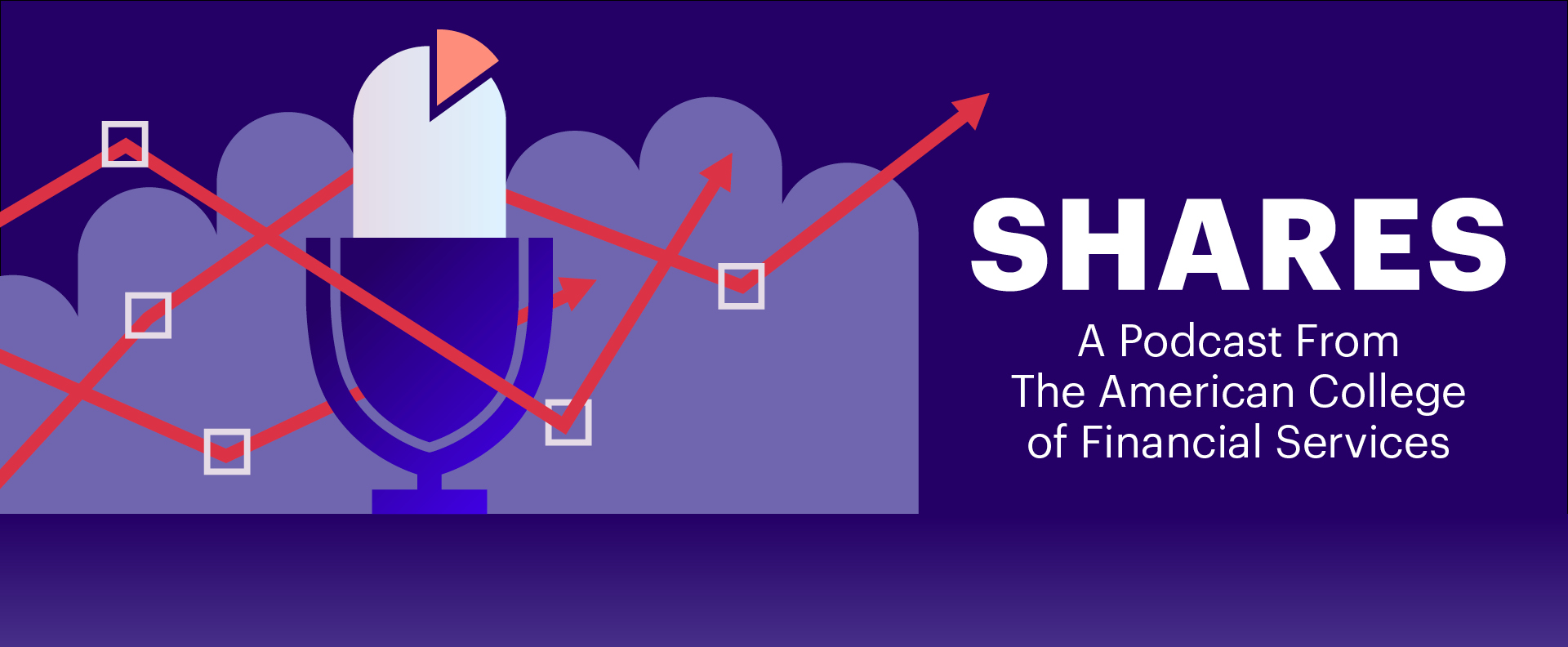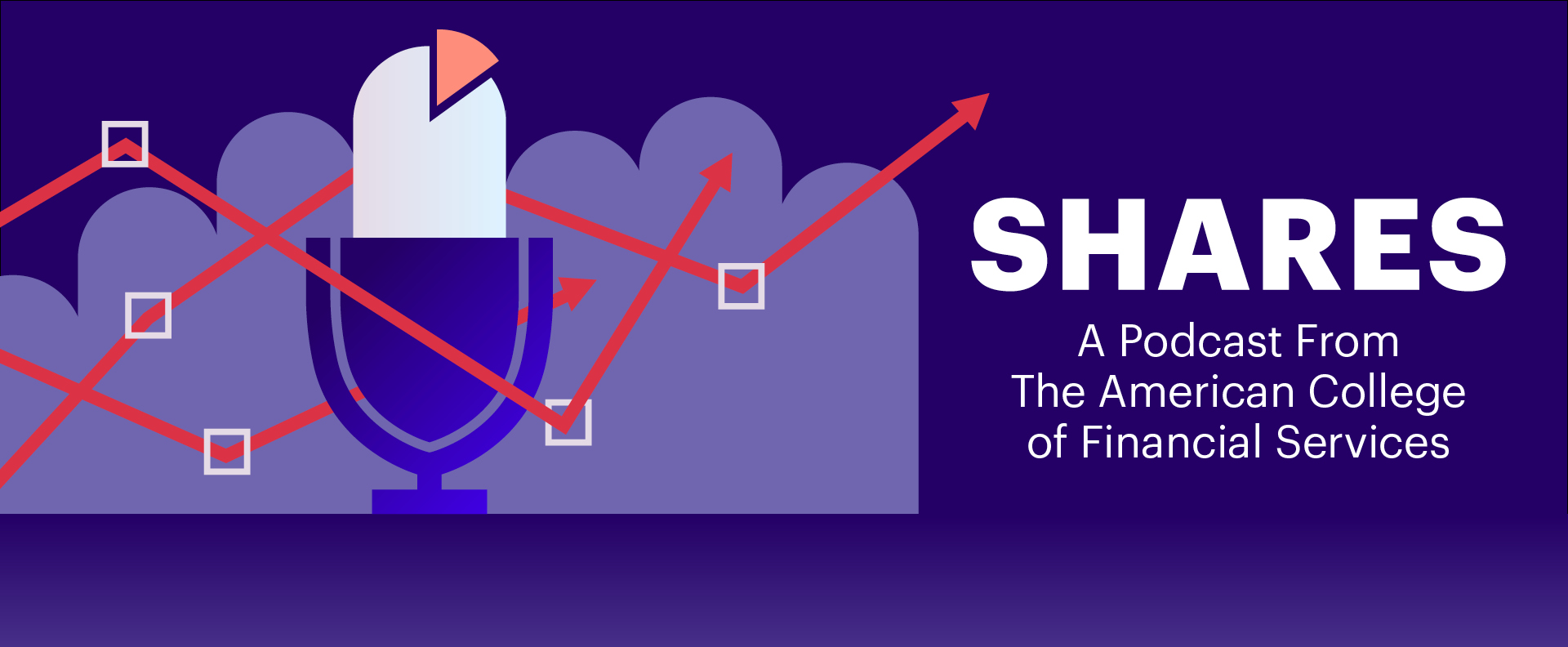Author
Subscribe to Newsletter
Related Posts
From Policy to Practice
NextGen in 10 Understanding Practice Acquisition
In this episode of our NextGen in 10 podcast, host Alanah Phillips, MBA speaks with Jordan Murray, CFP® about whether or not practice acquisitions live up to the hype, and the tough lessons he's learned going through the process.
Jordan Murray, CFP®, is an advisor with Acord & Fong Wealth Strategies and Lincoln Financial. Murray began his career as a financial planner immediately after college and has risen to become a partner in the practice. As a CFP® professional, he maintains a fiduciary standard with his clients and is held to the higher CFP® certification standard of ethics. He works mostly with retirees and small business owners primarily through personal introductions from existing clients.
Any views or opinions expressed in this podcast are the hosts’ and guests' own and do not necessarily represent those of The American College of Financial Services.
Ethics In Financial Services Practice Management Insights
Optimizing Your Practice’s Relationship With AI

With the growth of AI in the workplace, it may be time to consider how you can best implement AI tools to automate busywork and turn your attention to more valuable tasks that directly support your clients. Fortunately, our new practice management workbook is here to assist!
Learn more about common AI topics like the risks associated with AI, how much time you can save, and the best way to get started. We’ll also provide a closer look into more specific topics such as evaluating the prompts you provide to your AI tools and which activities in your workplace are best to delegate to AI.
Increase your knowledge on these trending topics and more as you propel your practice into the modern era of advising with help from our informative practice management workbook.
Shares: Going Deep on FIAs and RILAs

In this episode of our Shares podcast, host Michael Finke, PhD, CFP® speaks with Bobby Samuelson, an expert on annuity products, for a deep dive on their practical uses in financial planning and the ins and outs of how they can be used to benefit your clients.
Bobby Samuelson is the executive editor of The Life Product Review, one of the industry’s best sources for independent and objective life insurance product intelligence. He regularly presents at major industry events and has been quoted in The Wall Street Journal. He is also the President and CEO of Life Innovators, an independent product development firm helping life insurers create and implement unique life insurance and annuity products. Previously, Samuelson was the senior vice president and head of product development and pricing for life insurance and annuities at Brighthouse Financial, formerly MetLife US Retail. Prior to joining MetLife in 2013, he published The Life Product Review and was an independent consultant to life insurers, distributors, and advisors. He is the third generation of his family to work in the life insurance industry.
Any views or opinions expressed in this podcast are the hosts’ and guests' own and do not necessarily represent those of The American College of Financial Services.
Shares: What AI Knows About Retirement Income

In this episode of our Shares podcast, host Chet Bennetts, CFP®, ChFC®, CLU®, RICP®, CLF® speaks with Eric Ludwig, PhD, CFP® about their shared experience working extensively with AI platforms such as ChatGPT. They’ll revisit key takeaways from The College’s 2023 Retirement Income Literacy Study and how it relates to AI use in financial services, as well as how the emerging science of “prompt engineering” can help.
Eric Ludwig, PhD, CFP® is an accomplished retirement income planning expert, assistant professor of retirement income, and Retirement Income Certified Professional® (RICP®) Program director at The American College of Financial Services. As director of The College’s Center for Retirement Income, he is passionate about developing research and innovative solutions that help investors achieve financial security and personal fulfillment – two essential components of overall retirement wellbeing. Ludwig’s over 10 years of experience as CEO and wealth manager at Stockbridge Private Wealth Management bring a practical and dynamic perspective to academia. As a nationally recognized writer and researcher in behavioral finance and retirement planning, Ludwig has presented peer-reviewed research at the American Council of Consumer Interests (ACCI), AFCPE® Symposium, and CFP Board Academic Research Colloquium. He is on the editorial advisory board of the Journal of Financial Planning.
Any views or opinions expressed in this podcast are the hosts’ and guests' own and do not necessarily represent those of The American College of Financial Services.
Kaylee Ranck and Lindsey Lewis Talk Diversity in Financial Services
In their article, Ranck and Lewis discuss the importance of building an inclusive work environment and the benefits a practice can expect to incur once they have accomplished this goal.
Ranck and Lewis list several key action items, including the process of creating a safe space within your working environment, encouraging open dialogue, and recognizing and promoting diversity within the organization.
Ranck and Lewis believe firms adhering to these methods will not only grow their practices, but also find themselves better equipped to meet the needs of modern clients. Read on to hear more about how firms can grow through inclusivity!
FinServe Ambassador Highlights the Power of Education

Winslow is a managing partner at Nabell Winslow Investments & Wealth Management, a boutique wealth management firm affiliated with IBD Cetera Advisors, LLC, and located in the Wilmington, North Carolina area. But he often talks about his humble beginnings; of growing up on a rural farm and spending a lot of time hanging around the local general store, which served as a community gathering place. That, he says, is where he got his first taste of the importance of financial planning.
“One day, when I was 10 years old, I overheard a conversation about a family losing their farm to estate taxes,” he said. “The conversation was somber, and everyone was dismayed. At the same time, the old black and white TV in the corner was showing the current stock market numbers, and there was a lot of negative comments about how capital markets were a scam. Yet I couldn’t help but notice other families seemed to avoid losing much larger farms after a death in the family. It seemed obvious to me, even at that age, that someone was helping them create a better strategy.”
Winslow says when he got in his father’s old truck after that moment in the store, he talked about how he wanted to be someone who could help people with these sorts of matters: to help them understand money, structure their income and wealth, and to have a meaningful impact on their lives.
“My father thought I was crazy and an idealist,” he said. “But I never changed, and now I’ve been an advisor for nearly 30 years.”
From Emergence to Independence
Winslow’s career in financial services began in 1996, when he was recruited directly off his college campus by a financial services firm; from there, after an extensive training program, he moved from company to company, including stints at General Electric and a large regional bank – but he eventually realized this large-firm model wasn’t for him.
“I had a lot of problems where I felt I had managers who weren’t as skilled or well-informed as me making decisions that weren’t in the best interest of me and my family, and a few other people I knew felt the same,” he said. “My now-business partner and I wanted to be independent and client-focused, and it’s been one of the best decisions I’ve ever made.”
Winslow isn’t afraid to share his insights about the challenges of the RIA model, but he’s also quick to point out the benefits of being independent.
“There’s always a lot more risk in going it alone; we’re the people being held accountable, and if we’re not successful, we have no one to blame but ourselves,” he said. “On the other hand, our clients are now our bosses, so we’re able to focus on doing what’s best for them. It’s refreshing, but I know some advisors struggle with that being all on their shoulders.”
“There’s always a lot more risk in going it alone; we’re the people being held accountable, and if we’re not successful, we have no one to blame but ourselves. On the other hand, our clients are now our bosses, so we’re able to focus on doing what’s best for them.”
Because of the small nature of Nabell Winslow – five advisors and professional staff – Winslow says they didn’t even have to close during the COVID-19 pandemic like many other firms. While many of his peers found themselves running dry for business, the firm never once shut down and in fact saw some of the best years of its existence.
Powerful, Applied Knowledge
All that strength, however, is also owed to the fact that the Nabell Winslow team is highly educated – and Winslow says The College’s programs are in large part responsible for their success.
“My original firm was a big supporter of The College, and the people at the top of the production boards were always the ones with multiple designations,” he said. “I knew I wanted to be like them, so I made education my priority. Living in rural North Carolina, how else was I going to get a world-class education in specialized financial planning knowledge without a distance learning partner? The College was always there for me in that way, and with some of the top thought leaders in the world as part of their curriculum.”
“Living in rural North Carolina, how else was I going to get a world-class education in specialized financial planning knowledge without a distance learning partner? The College was always there for me in that way, and with some of the top thought leaders in the world as part of their curriculum.”
Winslow has earned multiple College designations over the years and says he values the knowledge he’s gained from all of them – but perhaps the most powerful and game-changing for his business has been the Retirement Income Certified Professional® (RICP®) Program. In his view, the RICP® is one of the best opportunities advisors in the industry have to serve their clients better.
“A lot of advisors are set on going after the ultra-wealthy or business owners, but when you’re working on retirement planning fundamentals like long-term care, it’s doesn’t matter if someone has a few thousand or a few million to retire on – you’re going to make a difference in their lives,” he said. “The RICP® shows you how to put so many techniques and strategies together and create a process, and with the retirement crisis facing America today, it provides an enormous opportunity.”
“The RICP® shows you how to put so many techniques and strategies together and create a process, and with the retirement crisis facing America today, it provides an enormous opportunity.”
Winslow also says that despite some concern among advisors about the fatigue of “alphabet soup” designations, the education financial professionals receive will help them in one hugely important area: standing out to their clients.
“While some designations may be more recognizable than others, what your clients really want to know is that they’re in good hands and that you’ll be thinking about what’s best for them, their family, and their situation,” he said. “They want to see you’re serious about doing right, having an applied, scientific approach to planning, and maintaining down-to-earth communication. Having designations across multiple areas really rounds you out and makes you more confident so you can provide better outcomes and a better client experience.”
Raising the Bar in Financial Services
As a former president of The College’s alumni council, Winslow remains passionate about the power of The College and its community to transform the industry and society through education. He says much of this is incumbent on individual advisors to seek out greater knowledge and opportunities to contribute to benefitting society.
“We need successful advisors to up their game; we need more mentors, more contributions of time and treasure, and to be constantly building our profession through applied financial science,” he said. “Education improves ethics, and improving ethics improves our standing and perception among consumers. We can build on that trust to increase financial literacy and lift everyone up.”
For these reasons, Winslow says he sees The College as uniquely positioned and prepared to take the lead in accomplishing these goals for the industry. He cites the work of The College’s many thought leaders, its Centers of Excellence, and its academic programs to demonstrate his belief that there is “no ceiling” to what can be achieved. However, he also emphasizes that individual advisors are also responsible for helping to build change.
“The success rates of advisors who join supportive teams and are mentored are much higher than ones who don’t. I went it alone and it was very hard; most people who I started with aren’t in the business anymore,” he said. “We need advisors to take responsibility for what they create – when you start getting up in years, you should take the opportunity to have a succession plan to ensure your business continues, for the sake of your clients and employees.”
Finally, Winslow accented a point that’s at the heart of The College’s mission with the FinServe Network and its NextGen Advisory Task Force: the power of young people.
“Lots of people I know in the industry tell me investing in young people is expensive,” he said. “That may be true, but in my experience the effort is well worth the reward.”
Daralee Barbera on Succession Planning for 2024 and Beyond
In her article, Barbera, the program director of The College’s Master of Science in Management (MSM) Program, analyzes what planning for practice succession looks like in 2024, key factors that need to be considered, and how these decisions can affect a practice’s relationship with its clients.
Barbera points out the importance of a strong succession plan, noting that clients will appreciate a firm’s preparedness for the future. She also suggests firms may want to consider female clients and advisors as they plan for their futures, citing the importance of having leadership that understands diverse clients and their future goals.
Read on to learn more about how Barbera believes women can play an instrumental role as many practices pave the way for future success!
Lindsey Lewis Discusses AI in Financial Services
In the article, Lewis, who is chair of the American College Center for Women in Financial Services, discusses the rapid growth of artificial intelligence (AI) and how certain tools that leverage AI can be used by financial advisors to promote efficiency and enhance overall client experience.
Lewis also shares several specific examples of AI tools advisors can use to create video content in 2023 and beyond, as well as use cases for each tool, and benefits advisors can reap by using these programs.
Read on to learn more about this topic as Lewis educates readers with several effective tips and tricks for using AI in their workplace.
Shares: All Aboard!

Our host Alanah Phillips, MBA, co-chair of The College’s Next Gen Advisory Task Force, sits down with Libby Greiwe, ChFC®, RICP®, FIC® of The Efficient Advisor for a conversation on how to onboard new clients and introduce professionals to the financial services industry, as well as how sound practice-building steps can reduce stress, lead to better business outcomes, and ultimately benefit advisors and clients alike in this episode of the Shares podcast.
Libby Greiwe, ChFC®, RICP®, FIC® is the founder of The Efficient Advisor, LLC and the host of The Efficient Advisor Podcast as well as a speaker, advisor coach, and financial professional. Her podcast helps financial advisors and planners create systems and processes so they can work less, feel less overwhelmed, and build a business and life that they love. She prides herself on providing step-by-step guides, templates, and tools advisors can customize for themselves and help them make the next right decisions to level up their practice. She previously worked as a financial advisor and principal for 15 years at Thrivent Financial and is a graduate of Miami University.
Any views or opinions expressed in this podcast are the hosts’ and guests' own and do not necessarily represent those of The American College of Financial Services.